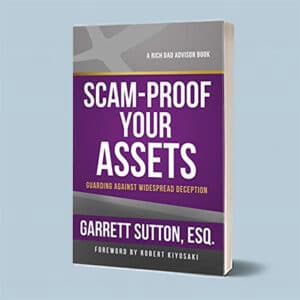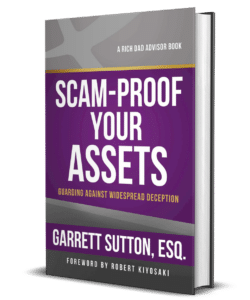Scam-Proof Your Assets: Guarding Against Widespread Deception, my newest Rich Dad Advisor book in several years, was released near the end of 2020. Cyber criminality is everywhere, costing people not only financial losses but emotional damage as well. You must be vigilant.
To learn the protective strategies you need against the cyber onslaught you may purchase the book from the RDA Press website.
I couldn’t fit all of the scams into Scam-Proof Your Assets. So the following excerpt isn’t in the book but is important for you to know.
While some frauds become harder to perpetrate due to better oversight, others become easier thanks to technology. One type of fraud that didn’t even exist just a few years ago is that involving cryptocurrency.
To illustrate what this is, let’s establish right now that currency is something that at least two parties agree has value and constitutes a type of payment. It’s a unit of exchange. When they taught real economics you would learn this. If I hold a dollar bill out to you, you see that as valuable because you can use it to buy things. We agree it’s money, so it is. Each dollar bill has a serial number on it, so according to the Treasury Department, that serial number represents legal tender in the amount of a dollar.
Well, in the case of cryptocurrency, a series of numbers—a sort of cryptography—represents an agreed-upon value. That series of numbers is currency, and it’s used to conduct transactions online. And like money, which the U.S. Treasury only produces a finite (albeit inflated) amount of, there is supposedly a finite amount of cryptocurrency. Promoters claim it is a finite amount but there is no intermediary—say the U.S. Treasury or a bank—to authenticate the value associated with that number. So in cyberspace it has value, but elsewhere, it’s a toss-up. You can’t go buy ice cream with it. Its price volatility is very high, making it unreliable. And it’s not a thing you can see or touch. It’s ideal for criminals.
The biggest and most well-known type of cryptocurrency is Bitcoin, though there’s no stopping anyone from creating their own cryptocurrency. In recent years, there are more than 1,500 of them, with more on the way. Because cryptocurrency is just a series of numbers, and because numbers, despite all claims, can be infinite, there’s no shortage.
Without certainty, but subject to animal spirits, the corresponding demand and value go up and down. Certainty arises when the two parties using it to buy and sell things agree on its value. So investment in Bitcoins or any other cryptocurrency is speculative at best. It only has value if people continue to want it and see it as valuable. The jury is still out. For all those who believe in crypto, that is fine. Go ahead and take down the Fed. But, for the rest of us, keep your guard up!
Bitcoin isn’t a scam—whether it has value or is useful is for you to decide. But what is a scam is when some fraudster throws out a lot of technical jargon and makes cryptocurrency sound like some unconquerable wave of the future. They claim they have some special insight to forecast a huge rise in cybercurrency, that it will eventually be the currency. In other words, for all its futurity, it is just another age old big pump-and-dump scheme. In December 2017, that’s what happened. Scammers intentionally pumped the value of Bitcoin so they could solicit investors, inflate the price up, then unload the ‘coins’ at a much higher value.
And many small investors fell for it, dumping all their money into it. Dipping a toe in is one thing, but pouring all your money into one investment is rarely a good idea—even a commodity you can actually see and use and has value. More on this subject in the book, Scam-Proof Your Assets.
In early 2017, Bitcoin’s prices went from under $1,000 to nearly $20,000 by the end of that same year. But then the market fell 80 percent, devastating investors who lost millions.
That hasn’t stopped scammers from plaguing Facebook with Bitcoin ads promising riches to savvy investors. In January 2018, Facebook instituted a policy banning Bitcoin and other cryptocurrency ads, but then later it relaxed those rules, allowing pre-approved advertisers to use its platform for these purposes, priming the pump yet again for a surge in cryptocurrency.
It bears repeating: Bitcoin and similar currencies have little, if any, actual intrinsic value, making it a prime target for crime. In fact, William H. Harris, Jr., founder of Personal Capital Corporation, a digital wealth management firm, reports that about 90 percent of all remote hacking is focused on Bitcoin theft by taking control of computers to mine their coins.
In 2019, a Ukrainian firm scammed $70 million from elderly investors in Britain, Australia and New Zealand. The company’s online ads featured interviews with celebrities such as Hugh Jackman and Gordon Ramsey who supposedly made a killing in crypto. High pressure salesmen in Kiev promised extraordinary returns. And the money all went down a Ukrainian rabbit hole.
“In what rational universe,” Harris writes, “could someone simply issue electronic scrip—or just announce that they intend to—and create, out of the blue, billions of dollars of value? It makes no sense.”
As Keller points out, “I get the idea that some of these ‘Bitcoin funds’ actually own no, or very few, Bitcoins, but are simply the next wave of Ponzi schemes. It’s actually a Ponzi schemer’s dream: Something that most folks don’t understand, but are being led by media buzz to believe it is the next big thing … Note to file: Nothing that you don’t understand is likely to ever turn out well.”



